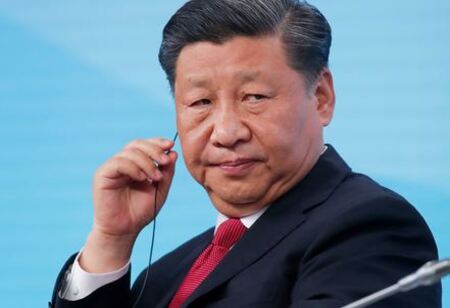
Xi Calls for Proper Handling of Frictions at With EU Officials


At a contentious conference focused on trade and the war in Ukraine, Chinese President Xi Jinping urged senior European Union officials to "properly handle differences and frictions" while denouncing Brussels' recent economic steps against Beijing.
After weeks of growing tension and squabbling over its format, the summit in the Chinese capital marking 50 years of diplomatic ties was met with low expectations. At Beijing's request, the summit's duration was abruptly cut in half to one day.
Xi informed visiting European Commission President Ursula von der Leyen and European Council President Antonio Costa that China is not the source of Europe's present problems.
Following von der Leyen's earlier call for a rebalancing of trade ties with the world's second largest economy, stating that relations were at an "inflection point," he urged the EU to "adhere to open cooperation and properly handle differences and frictions."
Also Read: Will Toyota's Latest Technologies Help It Win the EV Race?
According to Xinhua, "'Building walls and fortresses' is not enough to increase competitiveness," Xi stressed. "'Decoupling and breaking chains' will only result in isolation."
"It is hoped that the European side will keep the trade and investment market open and refrain from using restrictive economic and trade tools," stated Xi.
"As our cooperation has deepened, so have imbalances," von der Leyen said Xi during the meeting in Beijing's Great Hall of the People, according to a pool report.
"We have reached an inflection point," she added, urging China to "come forward with real solutions".
Also Read: China Blows Powerful Gusts of its Wind Energy Overpowering Competitors
Chinese shipments of EVs and other items have been the focus of EU trade proceedings in the past year, and the EU's authorities have frequently voiced their displeasure with China's industrial overcapacity.
Xi also cautioned EU leaders to "make correct strategic choices" in a more subtly critical statement of Brussels' current hardline posture against China.
Later, the two EU representatives will meet with Chinese Premier Li Qiang. One of the few positive developments in their collaboration to date is the anticipation that both parties will issue a small joint statement on climate.
Cui Hongjian, a professor of foreign policy at Beijing Foreign Studies University, stated that both sides were more in agreement about cooperating to address trade issues from the US at the beginning of US President Donald Trump's second term.
Von der Leyen accused China of flooding international markets due to its overcapacity and ‘enabling Russia's war economy’ on July 8, among other hawkish European rhetoric and tit-for-tat trade issues that preceded the summit.
The Europeans are anticipated to bring up issues including electric cars and China's export restrictions on rare earths, which caused global supply chains to break down and temporarily halt European auto factories in May.
However, according to customs data, China's shipments of rare earth magnets to the EU increased by 245 percent in June compared to May to reach 1,364 metric tons, which was still 35 percent less than the same month the previous year.
After extensive negotiations, the EU is expected to reach a trade agreement with the US for a general 15 percent export duty, avoiding the more severe 30 percent figure that President Donald Trump had threatened.

